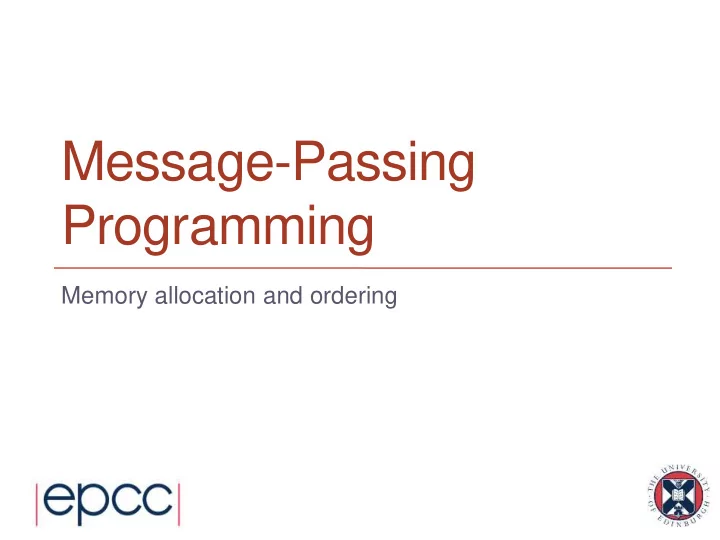

Message-Passing Programming Memory allocation and ordering
Fortran array syntax • MPI derived types enable strided data to be sent/received - no explicit copy in/out required • For Fortran - why not use Fortran array syntax? • Some subtleties for non-blocking operations - see notes on Learn 2
Array Layout in Memory C: x[16] F: x(16) 1 2 3 4 5 6 7 8 9 10 11 12 13 14 15 16 C: x[4][4] F: x(4,4) 13 14 15 16 4 8 12 16 j 3 7 11 15 9 10 11 12 2 6 10 14 5 6 7 8 1 5 9 13 1 2 3 4 i • Data is contiguous in memory - different conventions in C and Fortran - for statically allocated C arrays x == &x[0][0] 3
Aside: Dynamic Arrays in C float **x = (float **) malloc(4, sizeof(float *)); for (i=0; i < 4; i++) { x[i] = (float *) malloc(4, sizeof(float)); } x 1 2 3 4 9 10 11 12 x[0] x[1] x[2] x[3] 5 6 7 8 13 14 15 16 • Data non-contiguous, and x != &x[0][0] - cannot use regular templates such as vector datatypes - cannot pass x to any MPI routine 4
Arralloc float **x = (float **) arralloc(sizeof(float), 2, 4, 4); /* do some work */ free((void *) x); x x[0] x[1] x[2] x[3] 1 2 3 4 5 6 7 8 9 10 11 12 13 • Data is now contiguous, but still x != &x[0][0] - can now use regular template such as vector datatype - must pass &x[0][0] (start of contiguous data) to MPI routines - see PSMA-arralloc.tar for example of use in practice • Will illustrate all calls using &x[i][j] syntax - correct for both static and (contiguously allocated) dynamic arrays 5
Recommend
More recommend